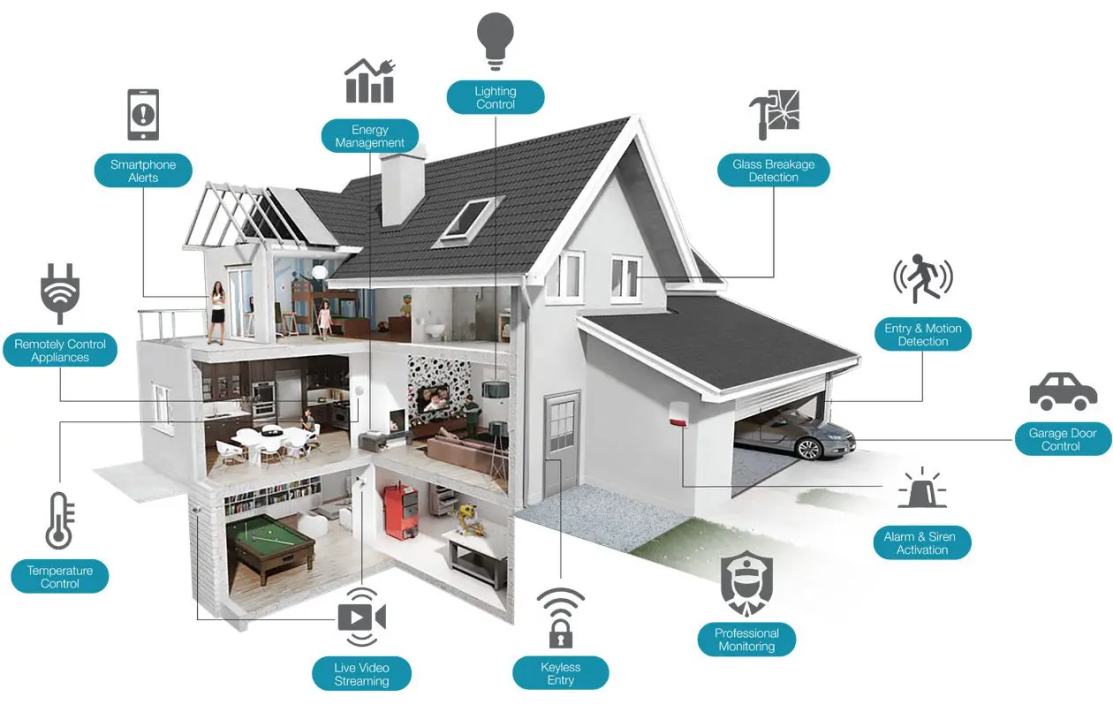Smart home technology has been steadily transforming the way we live, making everyday tasks more convenient, efficient, and connected. From lighting and security systems to home appliances and entertainment, smart home solutions are redefining the boundaries of traditional living spaces. With advancements in artificial intelligence (AI), the Internet of Things (IoT), and voice-controlled devices, the smart home movement is no longer just a concept of the future—it’s happening now. Let’s dive deeper into how smart home technology is reshaping modern life and the various ways it’s enhancing our day-to-day experiences.
The Rise of Smart Home Technology
Definition and Background
So, what exactly is smart home technology? Simply put, it refers to the use of internet-connected devices that can communicate and interact with one another to automate and simplify everyday tasks. These devices leverage IoT to enhance functionality, convenience, and efficiency. The rise of smart home technology has its roots in the rapid evolution of internet connectivity, AI, and cloud computing.
Historical Evolution of Smart Homes
The concept of smart homes began to take shape in the early 20th century when early technologies like automated heating systems and programmable thermostats were introduced. However, the real boom began in the 21st century, driven by advancements in wireless networks, sensors, and powerful processors. From the early days of smart lighting systems to today’s AI-driven ecosystems, smart homes have become more sophisticated and accessible to everyday consumers.
Key Benefits of Smart Home Technology
Convenience at Your Fingertips
One of the biggest perks of smart home technology is convenience. Imagine being able to control your home’s lighting, thermostat, security, and appliances from your smartphone or voice assistant. No more fumbling with multiple remotes or rushing to turn off lights—everything can be controlled from a single device, saving you both time and effort.
Automation of Everyday Tasks
Smart home technology automates everyday tasks, making them more efficient. For instance, smart thermostats can learn your preferred temperature settings and adjust accordingly, while smart lights can dim or turn off based on occupancy or schedules. It’s about simplifying your life so you can focus on what truly matters.
Improved Energy Efficiency
Gone are the days of high energy bills and wasted resources. Smart home technology plays a significant role in reducing energy consumption. Devices like smart thermostats, sensors, and automated systems ensure that energy is used more efficiently, leading to lower utility bills and a more sustainable home environment.
Enhanced Security Features
Smart home security systems add an extra layer of protection. With features like doorbell cameras, smart locks, and motion sensors, you can monitor and control your home’s security remotely. Intrusion detection systems alert you in real-time if something seems out of place, offering peace of mind whether you’re at home or away.
How Smart Home Technology is Shaping Modern Living
Streamlined Control Systems
Gone are the days of dealing with a mess of remotes and switches. Smart home systems bring everything under one centralized hub, making control seamless and easy. Devices can now talk to each other, creating an interconnected ecosystem that adjusts to your lifestyle.
Smart Devices Integration
The beauty of smart home technology lies in its ability to integrate seamlessly. From lighting and security to entertainment and appliances, all devices can work together, creating a synchronized environment tailored to your needs.
Voice Assistants and Smart Hubs
Voice assistants like Amazon Alexa, Google Assistant, and Apple HomeKit are at the core of smart home systems. They act as a hub that controls all connected devices with simple voice commands, eliminating the need for multiple controls.
Personalization for a Tailored Experience
Smart home technology takes personalization to the next level. Devices can learn your habits, preferences, and routines to create a customized experience that feels intuitive and natural. Whether it’s adjusting the lights when you enter a room or preheating the oven based on your cooking schedule, smart homes are designed to fit your lifestyle perfectly.
Impact on Home Design and Architecture
The Shift to Smart-Ready Homes
With the rise of smart home technology, there’s been a noticeable shift in how homes are designed. Smart-ready homes are now being built with IoT infrastructure in mind, ensuring devices can be seamlessly integrated without the need for extensive renovations.
Integration of IoT in Home Design
From smart locks to integrated lighting systems, IoT is transforming home designs. Homebuilders are now focusing on creating spaces that support smart technologies, leading to more efficient and connected living spaces.
The Future of Connected Spaces
In the future, connected homes will evolve into fully autonomous environments. Think of homes that adjust lighting, temperature, and security based on your presence and preferences without you having to lift a finger.
Energy Efficiency and Sustainability
Smart Home Systems and Energy Savings
Smart home technology helps reduce energy consumption by automating tasks like controlling lighting, heating, and cooling. Devices like smart thermostats and energy-efficient appliances ensure that energy is used only when necessary, cutting down wastage.
Renewable Energy Integration
Many smart home systems now integrate renewable energy sources like solar panels. They can optimize energy usage, storing and distributing power from solar or wind sources efficiently, helping homeowners transition to more sustainable lifestyles.
Reducing Carbon Footprint through Smart Tech
By reducing energy consumption and utilizing renewable resources, smart home technology contributes to a significant reduction in the carbon footprint of households, helping to combat climate change.
Security and Safety Advancements
Smart Security Systems
Smart home security systems offer more than just peace of mind—they provide real-time monitoring and alerts. Devices like smart locks, cameras, and sensors enhance home security, giving you control from anywhere.
Home Automation for Enhanced Safety
Automation plays a crucial role in improving safety. For example, automated systems can turn off appliances when not in use, preventing accidents and potential hazards like fires or water leaks.
IoT Devices and Intrusion Detection
With connected IoT devices, intrusion detection systems can monitor for suspicious activity and alert homeowners immediately, making security more proactive than ever before.
Smart Home Devices Revolutionizing Daily Life
Smart Appliances and Electronics
From refrigerators that remind you of grocery needs to washing machines that schedule laundry cycles, smart appliances simplify everyday chores and save time.
Connected Lighting and Smart Thermostats
Smart lighting adjusts to your needs, while thermostats learn your preferences and optimize energy use. These devices enhance both convenience and efficiency.
Home Entertainment Systems
Smart TVs and sound systems deliver personalized entertainment experiences, enabling seamless streaming and control via voice commands.
Smart Kitchen Gadgets
From smart coffee makers to intelligent ovens, kitchen gadgets have become more intuitive and connected, offering convenience and precision.
The Role of Artificial Intelligence (AI) in Smart Homes
AI-Powered Home Automation
AI-powered systems go beyond simple automation—they use machine learning to predict and adapt to your preferences, improving functionality over time.
Machine Learning for Predictive Insights
AI continuously learns your habits, anticipating your needs and adjusting settings to enhance your home experience.
Personalization Through AI
AI helps create personalized living spaces that cater to your unique preferences, making the smart home more intuitive.
Challenges and Limitations of Smart Home Technology
Privacy and Security Concerns
With so many connected devices, concerns about privacy and data security have emerged, especially regarding how companies use the information gathered.
Interoperability and Compatibility Issues
Different smart home devices often run on different platforms, leading to compatibility problems that can hinder seamless integration.
High Costs and Accessibility
While smart home technology offers many benefits, the upfront costs of purchasing and setting up devices can be high, making it less accessible for some households.
The Digital Divide
Not everyone has equal access to smart home technology due to disparities in income and internet connectivity, potentially widening the gap between tech-savvy and underserved communities.
Future Trends in Smart Home Technology
Advancements in 5G Technology
5G networks promise faster speeds and lower latency, which will enhance smart home connectivity and open up new possibilities for real-time automation.
The Growth of Smart Cities
As more cities embrace smart home technology, we’ll see integrated urban living environments where homes, infrastructure, and services are interconnected.
Emerging Technologies Like Smart Wearables
Wearable devices like smartwatches will become more integrated into smart home ecosystems, offering convenience and seamless control on the go.
The Expansion of Home Robotics
Robots designed for cleaning, maintenance, and other household tasks will continue to evolve, becoming an integral part of smart homes.
Smart Home Technology and Its Impact on Lifestyle
Transforming Everyday Habits
From remote work to smarter home management, smart home technology encourages healthier and more productive habits.
Remote Work and Connectivity
With increased automation, remote work becomes more streamlined, with devices ensuring a seamless home-office setup.
The Role of Smart Homes in Health and Well-being
Smart home devices contribute to healthier lifestyles, with features like air quality monitoring and wellness programs.
Family Interaction and Communication
Smart home technology enhances family connections through shared control systems, making daily communication easier and more efficient.
How Smart Home Technology Enhances Personalization
Tailored Smart Experiences
Devices now learn and adapt to your preferences, creating an environment that feels more intuitive and personalized.
Preferences Based on Daily Routine
From adjusting lighting to regulating temperatures, smart home systems tailor themselves to your routine without requiring constant input.
The Rise of Customizable IoT Devices
As customization grows, smart home devices become more flexible, allowing you to create a setup that truly fits your needs.
The Economic Impact of Smart Home Technology
Boosting Home Value and Resale Potential
Homes equipped with smart features tend to have higher resale values, attracting buyers who prioritize convenience and efficiency.
Job Creation in the Smart Home Industry
The demand for smart home technology has created new job opportunities, from software development to installation and support.
Cost Reduction Over Time
While initial investments can be high, smart home devices often pay for themselves through energy savings and increased efficiency.
Market Growth and Investment Opportunities
The smart home industry continues to grow, with ample investment opportunities in hardware, software, and IoT-driven solutions.
Conclusion
Smart home technology has fundamentally reshaped the way we live, offering convenience, energy efficiency, and enhanced security. From automation and AI-driven systems to IoT integration, smart homes are improving our day-to-day lives in ways that were once unimaginable. Although there are challenges like privacy concerns and accessibility, the future of smart home technology looks promising. As we continue to embrace these innovations, we can expect more personalized, efficient, and connected living experiences.
FAQs
- What are some examples of smart home devices?
Smart home devices include smart thermostats, lighting systems, security cameras, voice assistants, smart appliances, and more. - How much does it cost to set up a smart home?
The cost varies based on the devices chosen and the scale of the installation. Generally, a basic setup can range from a few hundred to a few thousand dollars. - Is smart home technology secure from hackers?
While smart home devices enhance convenience, security concerns like data privacy and hacking are real. However, proper security measures like encryption, firewalls, and secure passwords can help mitigate these risks. - Will smart homes replace traditional living?
Smart homes are enhancing living, but they complement rather than replace traditional lifestyles. They provide added convenience but won’t fully replace traditional systems. - What future trends are expected in smart home technology?
We can expect advancements like 5G integration, AI-powered automation, smart cities, and more wearable tech that integrates seamlessly with smart home ecosystems.




